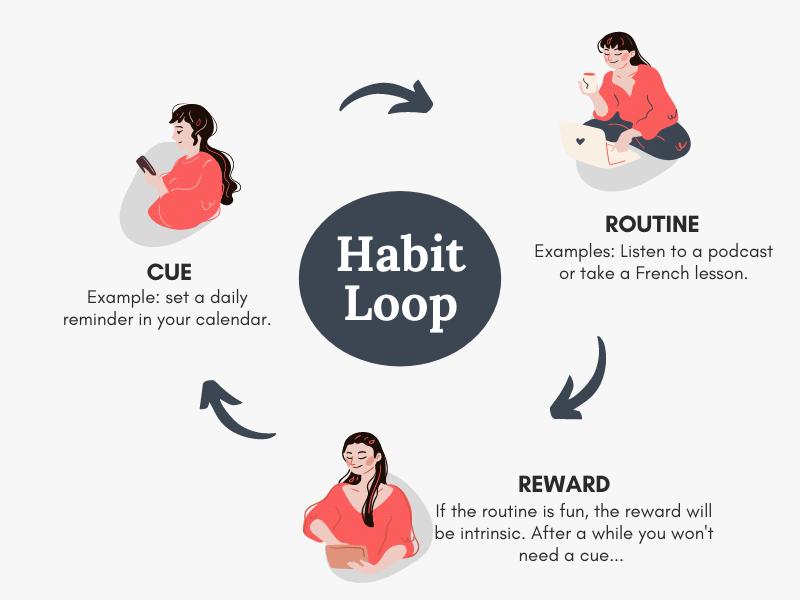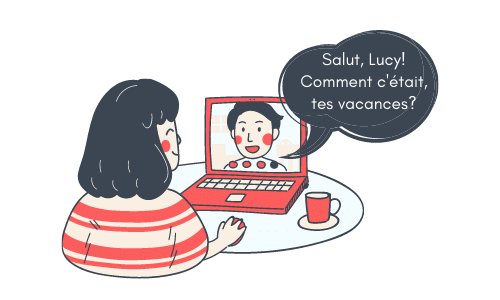How to learn French fast
By Constance Janini | Fact checked by Alex RedfernTechniques and tools for the quickest way to learn French
What is the fastest way to learn French? If you Google this question, you’re sure to find a whole host of websites claiming that their particular course is the best way to learn French fast.
The 'best' or quickest approach to learn French doesn't exist, however. I've met hundreds of language learners, and I can assure you of that. The optimal strategy for you will rely on a number of variables, including your time, money, language level, and goals.
But certain learning techniques are more effective than others.
This guide is based on my experience teaching French to dozens of students, as well as research into the methods used by multilingual individuals, that is polyglots.
Many people believe that polyglots are superhuman. However, they'll be the first to admit that they have no special language learning talents. Rather, their methods of learning are mostly responsible for their success in languages.
I will provide you with helpful resources, both paid and free, and I will also explain these methods.
Those to benefit most from reading this tutorial will have an A1/A2 or novice level in French. Check out this guide instead if you have an intermediate level, as it has advice tailored more to your aims and level.
Conversational fluency
Let’s be honest - I won't teach you how to learn French like a native speaker in six months. A true mastery of a language requires years of devotion, despite what some language schools might have you believe.
The good news, though, is that it takes far less time to achieve spoken fluency in a language.
The ability to have a regular, conversational pace when discussing common themes with native speakers is known as conversational fluency. It's necessary if you want to be able to properly integrate into a new country, interact naturally with locals, and get to know their culture from the inside. Unless your job demands that you speak the language perfectly, you should focus on becoming conversationally fluent.
In six to twelve months, you can become fluent in French. This guide will tell you how.
How to strategically boost your vocabulary
Acquiring linguistic skills might appear like an overwhelming task. How will I be able to commit hundreds of new phrases to memory, you might wonder. Thankfully, there are methods that can assist you in striking up a discussion quickly:
- Gain familiarity with the most frequently used words. Similar to other languages, spoken French is mostly composed of a limited amount of words. Luckily, you can find lists of these common words online - see my next point...
- Leverage flashcards. These apply a spaced repetition algorithm to help you master French vocabulary faster. And on Langua, you can actually find flashcard packs that contain the 5k most commonly used words. Learn these to build your ability to understand French as fast as possible.
- Learn similar words. Thankfully, there are hundreds of French terms that are identical - or nearly identical - to English. These are called cognates. For example, the French word "concert" is a perfect cognate for "concert" in English. Easy, right? But there are also a large number of near-perfect cognates that can be easy to learn, for example: une banane > a banana; une heure > an hour; l’océan > the ocean.
- Take down new words in a notepad. According to research, writing something by hand enhances memory recall far greater than typing. This is believed to be because writing takes longer and requires more complex brain processing power. Who thought the humble pen and paper was a thing of the past, eh?
You can learn French fast with these 4 strategies for boosting your vocabulary.
Establish routines to maintain language learning progress
Language proficiency "boils down to consistent practice multiplied by time," claims polyglot and language mentor Alex Voloza.
At first, it might be easy to practise regularly. However, it's more difficult to maintain throughout months and years. So, what is the greatest way to increase your chances of practising consistently for an extended length of time?
The answer is: by establishing routines. The key to changing your behaviour is to develop habits because once you do, you can stop depending on motivation or willpower.
Cues and incentives are used to create habits. The behaviour begins when the cue is received. Setting a daily reminder in your calendar to practise at the same time every day can act as a trigger for learning French. The best kind of incentive is the satisfaction that comes from knowing you're improving and having fun while practising; and rest assured, the resources I've recommended below don't include anything dull or monotonous.
If this isn't enough for you, though, you may promise yourself a more motivating external reward: how about a weekend trip to Paris?!
Also, informing friends and family that you plan to practise daily is another technique to inspire yourself to stick with it. Since everyone wants to keep their commitment and avoid losing face, telling others can keep you moving forward in your goal to learn French quickly.

The most effective activities and resources for learning French quickly
As you scroll through the resources I’ve provided below, don’t forget that your choices should always reflect your goals. If your goal is to find the quickest way to learn French, focus most of your practice time on speaking and listening. You should also bear in mind that speaking practice is far more efficient than writing. This is simply because it takes more time to write a sentence than it does to say it! Logique, non?
OK. Now let's go through some of the best resources for learning French quickly, and I’ll also explain how best to use them:
Podcasts
Listening to a French podcast every few days (or even once a day if you have time!) will greatly enhance your ability to understand French as spoken by natives. If you are short on time, you can always consider listening to a podcast while doing the dishes, taking the dog for a walk, or commuting to school or the office.
There are dozens of free podcasts. You can find these French podcasts categorised by level & dialect on Langua.
To get the most out of podcasts, try parroting what the hosts say even now and again. This will not only help you remember words but also enhance your pronunciation. It’s also a good idea to listen to podcasts with transcripts and learn any vocabulary you don't understand.

Speaking Practice
There are three main alternatives for learning to speak French: language exchanges, classes & practising with AI.
If you live in a city and already know some French, look into language exchanges, which are where groups of individuals come together and take turns speaking different languages. These events are not only a wonderful way to meet new people but also offer a comfortable environment in which to rehearse.
Sounds great, right? But there are downsides to language exchanges: they are actually quite inefficient ways to learn. This is because you may have to spend time travelling to the meeting place, and while there, you could spend half of your time assisting people in your native language rather than practising your French. Don’t get me wrong, they are useful practice, but they are not the quickest way to learn French - especially if they are your sole source of conversation practice.
By far the best and the quickest way to learn French is to attend one-on-one sessions targeted to your specific needs. The cost can be a little higher, but if you're taking the classes online, you can find a tutor for as little as $14/h (approx. €13 or £11).
A skilled tutor will dedicate at least 70% of the lesson time towards your speaking time while making you feel comfortable making mistakes and providing extensive and personalised feedback. If you're keen to learn French rapidly, you can check here to find the best online French tutor based on your availability and budget.

In the last year, another option has become available: speaking French with artificial intelligence. Several platforms offer this, including Langua. You can use Langua to practice role plays that replicate real-life situations, as well as engage in debates and talk about what interests you. The AI will ask intelligent questions to get you expressing yourself, as well as provide corrections and explanations to help you make progress. Learning French with AI is ideal if you want the flexibility to practice conversing whenever you have a moment free. You can try Langua here.
The News & Netflix
If you already know a little French, try following the international news occasionally in French rather than in English. Presenters of news broadcasts are often trained to speak very clearly, and you'll more than likely already be familiar with some of the news stories. Both of these factors will aid your ability to understand. Some options for news in French include: RFI and France 24.
Apart from news programmes, if you have Netflix or a similar streaming service such as Amazon Prime or HBO, you have easy access to a wide variety of French-language television shows. Some of the best TV shows to binge on, and some of my personal favourites, include Lupin, Black Spot, Family Business, and Emily in Paris. Do note, however, that it’s highly recommended to turn on French subtitles rather than English to ensure you maximise your exposure to French.
Common mistakes when trying to learn French fast
You're now aware of some of the best strategies and resources for learning French fast. But to maximise your chances of succeeding, it's important you avoid the following pitfalls:
- Obsessing over the grammar. While learning the fundamentals is important, faultless grammar is not required to be able to communicate effectively. If you find grammar exercises tedious, keep in mind that whether you talk, read, or listen to French, you will naturally learn a lot of grammar. Grammar is all around you and the more you expose yourself to the language, the more you will acquire - much like we do our mother tongue.
- Avoiding speaking. If your goal is to learn French quickly to a conversational level, you must start speaking early on, which means becoming comfortable with making mistakes. In fact, the more mistakes you make, the faster you'll receive immediate feedback and improve. I once rather confusingly told a French shop assistant “Je cherche un bras" (I'm looking for an arm), when what I meant to say was “I’m looking for a bra” (Je cherche un soutien-gorge). An awkward moment to say the least, but definitely a new false friend I learnt quickly and never forgot again!
- Wasting time on apps. Language study programmes like Duolingo can help beginners learn basic vocabulary and grammar. However, if your aim is to be able to converse in French, I promise you answering multiple choice questions on an app is not the quickest way to get there. The best way to learn French quickly is through speaking and listening practice with other people.
- Kidding yourself that you don't have enough time. The truth is, you just need up to 15 minutes per day to make noticeable progress. Consider your everyday commute; thanks to mobile technology, you can use this time to revise vocabulary, watch the news or listen to French podcasts. Do you enjoy bingeing on TV series? Watch French dramas with French subtitles instead.
You can learn French fast, irrespective of your budget.
I hope you’ve found this guide useful. I've provided you with everything you need to learn French quickly, even if your budget is low. So, now it’s time to put your new-found information to work and take action. Start developing daily learning habits. Give the resources I suggested a try and create a preliminary plan similar to the one I used below:
Day 1: Listen to a podcast episode and read the transcripts. Find French podcasts matching your level and preferred dialect here.
Day 2: Find a French tutor online and book a trial session.
Day 3: Start a French series on Netflix (with French subtitles on).
Day 4: Learn 50 of the most commonly used French words.
Day 5: Try practising speaking with an AI French tutor.
Day 6: Pop along to a local language exchange and practise what you have learned so far.
¡Bonne chance! (Good luck!)

About the author:
Constance Janini is an experienced French teacher with a double diploma in Literature and Linguistics, specializing in French, German, and English. She is currently completing her Master's degree in French for Foreign Learners (FLE, Français Langue Etrangère). With over 7.5 years of experience teaching both online and face-to-face, Constance has guided numerous students through the process of preparing for DELF A1 to B2 examinations. If you're considering taking French classes, you can view Constance's profile here.

